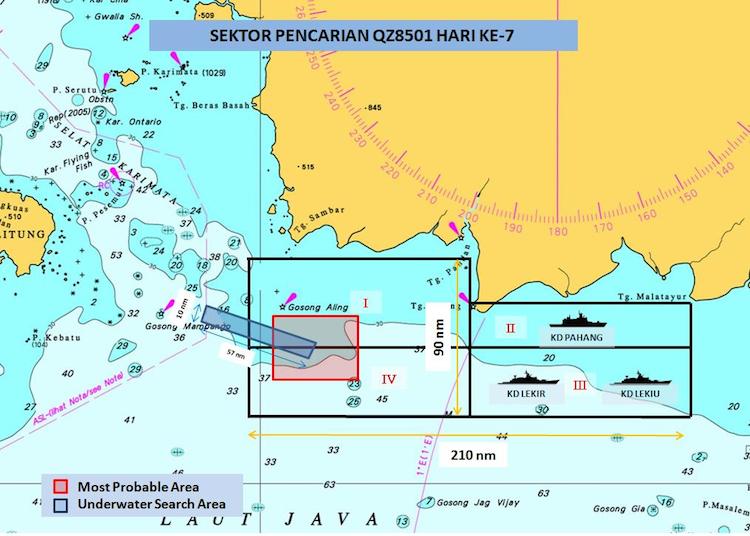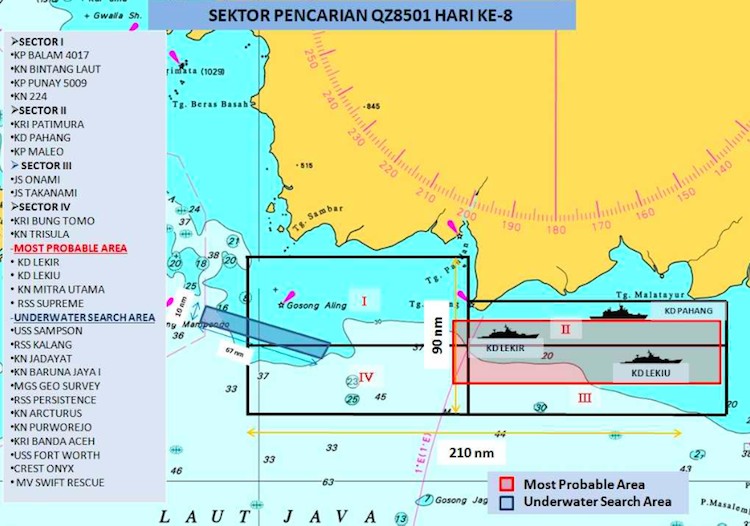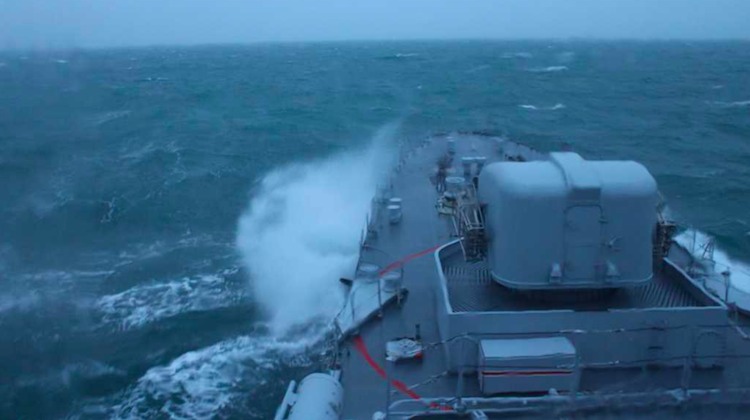One week since Indonesia AirAsia flight QZ8501 disappeared from radar over the Java Sea, the recovery and investigation are proceeding slowly. Seasonally high seas and winds up to 56 km/h are continuing to complicate remote submersible and diver operations, while the search areas have been expanded slightly eastward and the Most Probable Area focus for the recovery effort has been enlarged significantly and moved eastwards by over 185km.
Decisions on the search area are made by Indonesian SAR agency BASARNAS, reports Malaysian Chief of Navy Admiral Abdul Aziz Jaafar, whose vessels are involved in the recovery.

Compared with the search map for January 3 (above), the January 4 search area (below) appears to have been extended approximately 50km to the east in sectors II and III, which are also the location of the Most Probable Area search, which has increased by roughly 200 per cent.

Such a significant increase would seem to suggest either that earlier announcements of the majority of the wreckage being located turned out to be inaccurate, or that the wreckage located was incomplete. In such an event, the extensive speculation about the likely cause of the crash would appear to have been premature.
Neither the flight data recorder, nor the cockpit voice recorder, nor pings from their underwater locators, have been located.
Ill-judged Indonesian Meteorology agency report blames weather
“AirAsia QZ8501: Plane crash blamed on weather,” read the headlines after the Indonesian Agency for Meteorology, Climatology and Geophysics (BMKG) released what seems to be a very ill-advised and poorly toned report into the weather a week ago when the Airbus A320 disappeared from radar.
“Based on the available data received on the location of the aircraft’s last contact, the weather was the triggering factor behind the accident,” the report said, according to a translation by Channel News Asia. BMKG’s website – and the report – is entirely in Bahasa Indonesia, and Australian Aviation has reviewed a machine translation of it.
The report is incredible for two reasons: firstly, that a weather agency was either authorised to speak for and to prejudice the ongoing investigation in this matter, or is operating without enough oversight to prevent it from doing so. This is not how a professional aviation investigation is run.
Secondly, BMKG is responsible for forecasting weather and communicating forecast products like METARs to, among others, airlines like AirAsia. It is astounding that the agency at least partly responsible for ensuring commercial aircraft are kept safe from unusual weather phenomena is so quick to blame weather while remaining silent about its own role in communicating that weather to airlines.
A compounding problem for the investigation comes when outlets such as the BBC run headlines like “AirAsia QZ8501: Plane crash blamed on weather”. It is not clear from the article whether the BBC, which appears not to have internal expertise on aviation, made any effort to ascertain, consider and communicate the reliability and biases of the information in the report. Nor is it clear whether the BBC approached knowledgeable sources like the UK Air Accidents Investigations Branch or the Met Office.

Questions and concerns have arisen into the recovery and investigation
The move seriously calls into question how the Indonesian government is conducting the recovery operation and the investigation into the causes of the crash.
In the last days, Indonesian government officials have made duelling press statements, released body retrieval numbers that are different by orders of magnitude, and presented a remarkable lack of news releases in languages other than Bahasa Indonesia.
Indonesia and Singapore’s civil aviation authorities are also in disagreement over whether Indonesia AirAsia was authorised to operate a seven-day service between Surabaya and Singapore: Singapore says yes, Indonesia says no.
Whatever the answer, it won’t engender trust in Indonesian aviation governance and the Directorate General of Civil Aviation (DGCA): if the airline did not have permission, DGCA’s oversight has been incompetent; if the airline did, then DGCA’s actions following its announcement have been both incompetent and unreasonable.
The situation is very different from other recent incidents: think back to the frequent, informative briefings by former NTSB chair Deborah Hersman following the Asiana 704 crash at San Francisco, or the regular updates (initially in French, followed swiftly by English) by the BEA following Swiftair/Air Algérie 5017, when Malian authorities requested its assistance.
While news briefings are being conducted within Indonesia, a lack of media releases, web broadcasts or translations is affecting the amount of transparency that analysts, journalists and the industry outside Indonesia can bring.
For the DGCA and the wider government of a country where all but four airlines are banned from serving the EU and other states for safety oversight reasons, questions over the competence of its oversight – of airlines, of DGCA, of BMKG, and of the QZ8501 investigation – deserve answers.




